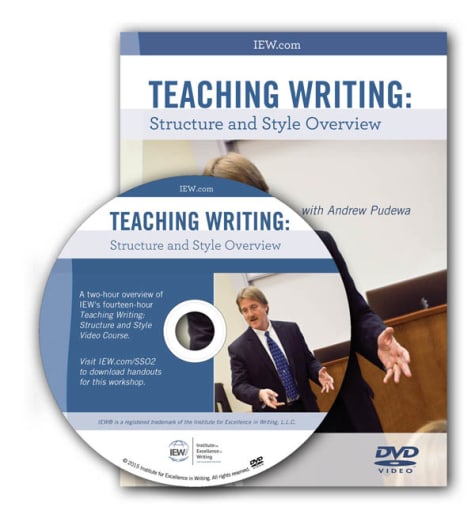You might think of this 2 hr, 20 min DVD as TWSS Lite. Andrew Pudewa provides a brief introductory overview of the nine units of his Teaching Writing Structure & Style seminar/methodology along with several stylistic techniques. The DVD also provides accompanying seminar handouts. While it's still preferred that those using the theme-based writing lessons experience the master TWSS seminar, this condensed version is perfect for parents of students taking classes using the IEW methods. Updated to align with the 2015 version of TWSS. ~ Janice
Structure and Style Overview DVD
Description
Teaching Writing Structure and Style is a method rather than a program. If you’re looking for a product that will equip you to be a writing coach and improve your own writing skills along the way, give you a general outline that will guide you in teaching composition at all levels, and provide an overall approach to writing instruction applicable for years to come, then check this out.
The main course is a 14-hour training seminar aimed at you as teacher. The skills taught are also demonstrated as an introductory writing workshop for 3 different age ranges (K-5; 6-8; and 9-12).
This seminar features Andrew Pudewa, homeschooling father of seven, giving the presentation that he has shared across the country. He feels that if you as teacher possess the proper skills for writing, you’ll will be able to teach these skills to your students. The workbook that is provided includes notes from the seminar as well as lots of samples and examples.
The writing seminar covers two basic components of composition structure and style (no surprise here) – and is divided into nine units: Structural Models, Note Taking and Outlines; Introducing Stylistic Techniques and Dress-Ups; Summarizing References; Retelling Narrative Stories; Summarizing a Reference; Writing from Pictures; Summarizing Multiple References; Inventive Writing; Formal Essay Models; and Formal Critiques/Writing about Literature. These may be used in the order presented, or you may use the unit that most suits your needs at the time. As you can tell from these units, structure is both the type of writing and the method of organizing the writing.
Style, on the other hand, is taught throughout the units, one technique at a time. Style includes such things as varying sentence openings, using similes and metaphors, or repeating certain words for effect. The author feels that teaching style is more like teaching art or music rather than math or science. The idea is to help students develop a creative flow of well-conceived thoughts. Some students will master a lot of the material quickly, while other students will master only a portion of the material, but all will achieve variety and competence in expression. He also stresses separating the writing of ideas from mechanics (grammar, spelling and penmanship). Both are important, but most people can only do one at a time.
The writing instruction methods gleaned from this seminar can be used with students from early elementary age on up and over a succession of years. The unit focus might stay the same, but students will gradually strengthen and expand their skills. The program also addresses common problems among writing teachers: overcorrecting, not giving enough help when needed, unclear assignments, and over-expectation. It is designed to help you bring the best out in your student.
The Student Workshops are four short lectures (40-60
minutes) where 3 grade-level groupings of students are taught by the author
using this approach. These workshops (and all the IEW material) are designated
for these age groups: 3rd – 5th grades, 6th – 8th grades, and 9th – 12th
grades. Although the focus of these workshops is introductory, they will give
you confidence and presentation ideas for all units.
There are two ways to purchase this program – each with its own advantages. The seminar is available as a set of DVDs (nine with content for the teacher and three for the student demonstrations) plus a video streaming subscription. This option allows you to re-watch in subsequent years at no additional cost. There is also a video streaming-only subscription option (one year, renewable). This gives you access to the video content for one year but requires a renewal fee for usage in subsequent years. Both options include a copy of the seminar workbook. To use the Student Writing Intensive programs, you’ll need this Teaching Writing Structure and Style resource to begin. ~ Ruth
| Product Format: | Other |
|---|---|
| Grade: | AD |
| Brand: | Institute for Excellence in Writing |
| ISBN: | 9781623412425 |
| Length in Inches: | 7.5 |
| Width in Inches: | 5.5 |
| Height in Inches: | 0.5 |
| Weight in Pounds: | 0.2 |

